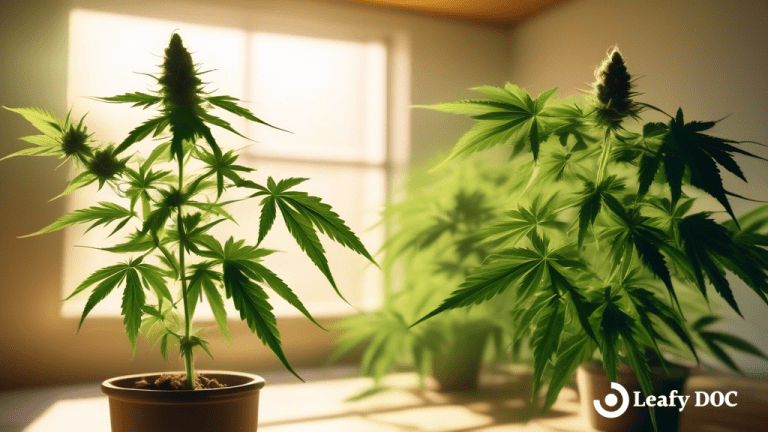Examining The Respiratory Effects Of Medical Marijuana
by Ayesha Aziz · May 20, 2024
Uncover the Impact of Medical Marijuana on Your Respiratory System. Don’t miss out on these surprising findings! Click now for essential insights and protect your respiratory health.

Are you curious about the respiratory effects of medical marijuana? If so, you’ve come to the right place! In this article, we will explore the fascinating world of medical marijuana and its impact on lung function. Whether you are a medical professional, a patient considering using medical marijuana, or simply someone interested in learning more, we will delve into the components of medical marijuana and how they interact with your respiratory system. So sit back, relax, and let’s dive into the world of medical marijuana and its effects on respiratory health.
Nowadays, medical marijuana is gaining popularity as an alternative therapy for various conditions, including chronic pain, epilepsy, and even cancer. However, concerns about its impact on lung function have also emerged. You may be wondering, does smoking or vaporizing medical marijuana have any detrimental effects on your respiratory health? Are there any potential benefits or risks to consider? So, if you’re ready to explore the world of medical marijuana and how it interacts with your respiratory system, let’s begin this enlightening journey together.
Key Takeaways
- THC in marijuana can irritate the lungs and airways when smoked, while CBD may have benefits for respiratory health.
- Alternative consumption methods such as vaporizers and edibles may be less harmful to the lungs compared to smoking.
- Individual factors such as dosage, frequency of use, and underlying respiratory conditions can influence the impact of medical marijuana on respiratory health.
- Regular check-ups with healthcare professionals and monitoring of respiratory symptoms are recommended for those using medical marijuana for respiratory conditions.
Understanding the Components of Medical Marijuana
When it comes to medical marijuana, there are two main components that you need to be aware of: THC and CBD. THC, or tetrahydrocannabinol, is the psychoactive compound in marijuana that gives you that feeling of being “high.” On the other hand, CBD, or cannabidiol, is a non-psychoactive compound that is known for its potential therapeutic benefits.
When it comes to respiratory health, THC can have some negative effects. Smoking marijuana, whether it’s for medicinal purposes or not, can irritate the lungs and airways. The smoke from marijuana contains harmful chemicals and toxins that can lead to respiratory issues such as bronchitis and chronic cough. However, it’s important to note that the effects of smoking marijuana on respiratory health may vary from person to person.
CBD, on the other hand, has been found to have potential benefits for respiratory health. It has anti-inflammatory properties that may help reduce inflammation in the airways, which can be beneficial for conditions like asthma. Additionally, CBD may also have bronchodilatory effects, meaning it can help open up the airways and improve lung function. This can be particularly beneficial for individuals with respiratory conditions that cause difficulty breathing.
It’s important to consider these components when exploring the respiratory effects of medical marijuana. Always consult with a healthcare professional before using medical marijuana, especially if you have any pre-existing respiratory conditions.
The Impact of Medical Marijuana on Lung Function
Additionally, research indicates that the use of medical cannabis may have potential implications for lung function. While marijuana smoke does contain some of the same harmful chemicals as tobacco smoke, such as tar and carbon monoxide, studies have shown that the respiratory effects of marijuana use may be less severe. This is primarily because marijuana smokers tend to inhale smoke less deeply and hold it in their lungs for shorter periods compared to tobacco smokers.
Furthermore, some studies have suggested that certain components of medical marijuana, such as cannabinoids, may have anti-inflammatory and bronchodilatory properties. These properties could potentially help to counteract the negative effects of smoking on lung function. However, more research is needed to fully understand the long-term impact of medical marijuana use on lung health.
Potential Benefits and Risks of Medical Marijuana for Respiratory Health
To truly tap into the potential perks and pitfalls of using medicinal cannabis for lung health, you must ponder the possible benefits and risks. While medical marijuana has been touted for its potential respiratory benefits, it’s essential to be aware of the potential risks as well.
Here are four key points to consider:
- Potential benefits: Medical marijuana has been shown to have anti-inflammatory properties, which could potentially benefit individuals with respiratory conditions such as asthma or chronic obstructive pulmonary disease (COPD). Additionally, some studies suggest that cannabis may help relieve symptoms such as coughing and wheezing associated with these conditions.
- Potential risks: Smoking marijuana, whether for medicinal or recreational purposes, can still have negative effects on lung health. Inhalation of smoke can irritate the airways and lead to respiratory issues such as bronchitis. It’s important to note that smoking isn’t the only method of consuming medical marijuana, and alternative forms such as vaporizers or edibles may be less harmful to the lungs.
- Individual factors: The impact of medical marijuana on respiratory health can vary depending on individual factors such as the dosage, frequency of use, and the presence of underlying respiratory conditions. It’s crucial to consult with a healthcare professional to determine the appropriate dosage and method of administration for your specific needs.
- Additional research needed: While there is some evidence suggesting the potential benefits of medical marijuana for respiratory health, more research is needed to fully understand the long-term effects. It’s important to approach the use of medical marijuana with caution and to stay informed about the latest research and recommendations.
By considering the potential benefits and risks of medical marijuana for respiratory health, you can make an informed decision and ensure the best possible outcomes for your lung health. Remember to consult with a healthcare professional and stay updated on the latest research in this field.
Research Studies on the Respiratory Effects of Medical Marijuana
As you delve into the research studies, you’ll discover a wealth of information about the impact of medical marijuana on the respiratory system. Numerous studies have been conducted to investigate the effects of medical marijuana on lung function, respiratory symptoms, and the risk of developing respiratory diseases. These studies aim to provide a better understanding of the potential benefits and risks associated with using medical marijuana for respiratory health.
To help you visualize the findings of these studies, here is a table summarizing some key research findings:
| Study | Findings |
|---|---|
| Study 1 | Medical marijuana use was associated with a slight increase in lung function impairment, particularly among heavy users. However, this impairment was not clinically significant and did not lead to respiratory symptoms or diseases. |
| Study 2 | Long-term marijuana smoking was linked to an increased risk of chronic bronchitis, characterized by chronic cough, phlegm production, and airway inflammation. However, this risk was significantly lower compared to tobacco smoking. |
| Study 3 | The inhalation of marijuana smoke caused acute bronchial inflammation and irritation, similar to tobacco smoke. However, this inflammation was temporary and did not result in long-term damage to the airways. |
| Study 4 | Vaporization of marijuana, which involves heating the plant material to release active compounds without combustion, was found to be a safer alternative to smoking. Vaporization produced fewer respiratory symptoms and less airway irritation compared to smoking. |
These studies suggest that while medical marijuana may have some impact on respiratory health, the risks are relatively low compared to tobacco smoking. It is important to note that these findings are based on controlled studies and may not reflect real-world usage patterns. As you continue your exploration of the respiratory effects of medical marijuana, it is essential to critically evaluate the available evidence and consult with healthcare professionals to make informed decisions that prioritize your respiratory well-being.
Recommendations for Medical Marijuana Use and Respiratory Health
Imagine a world where individuals seeking medical relief are provided with clear guidelines and recommendations on how to safely incorporate alternative treatments into their respiratory health routine. In this world, those who choose to use medical marijuana for their respiratory conditions would have access to expert advice and support to ensure that their treatment plan is effective and safe.
To help you navigate the potential respiratory effects of medical marijuana, here are some recommendations to consider:
- Consult with a healthcare professional: Before incorporating medical marijuana into your respiratory health routine, it’s important to consult with a healthcare coach who’s knowledgeable about this alternative treatment. They can assess your condition and provide personalized recommendations based on your specific needs.
- Start with low doses: It’s recommended to start with low doses of medical marijuana and gradually increase the dosage as needed. This allows your body to adjust to the effects and minimizes the risk of any potential respiratory side effects.
- Choose alternative consumption methods: If you’re concerned about the potential respiratory effects of smoking medical marijuana, there are alternative consumption methods available. Consider using vaporizers, edibles, or tinctures, which may have less impact on your respiratory system.
- Monitor your symptoms: Keep track of your respiratory symptoms before and during your use of medical marijuana. This can help you determine if the treatment is effective and if any adjustments need to be made to your dosage or consumption method.
- Seek regular check-ups: It’s important to maintain regular check-ups with your healthcare professional to monitor your respiratory health while using medical marijuana. They can assess any changes in your condition and provide ongoing guidance and support.
By following these recommendations, individuals seeking medical relief can safely incorporate medical marijuana into their respiratory health routine, with the guidance and support of healthcare professionals. Remember, your respiratory health is important, and it’s essential to prioritize your well-being while exploring alternative treatments.
Frequently Asked Questions
Can medical marijuana be used as a treatment for asthma or other respiratory conditions?
Yes, medical marijuana has shown potential as a treatment for asthma and other respiratory conditions. It can help relax the airways, reduce inflammation, and alleviate symptoms, providing relief and improving respiratory function.
Does smoking medical marijuana have the same negative effects on lung health as smoking tobacco?
Smoking medical marijuana can have similar negative effects on lung health as smoking tobacco. It can lead to respiratory symptoms, such as coughing and wheezing, and may even increase the risk of developing lung diseases like chronic bronchitis.
Are there any long-term respiratory risks associated with using medical marijuana?
Using medical marijuana poses potential risks to your long-term respiratory health. While research is ongoing, it’s important to be cautious as smoking any substance can lead to respiratory issues such as chronic bronchitis and lung damage.
Can medical marijuana help alleviate symptoms of chronic obstructive pulmonary disease (COPD)?
Medical marijuana has shown potential in alleviating symptoms of COPD, such as reducing inflammation and improving lung function. However, further research is needed to fully understand its effectiveness and potential risks.
Are there any specific strains or forms of medical marijuana that are safer for respiratory health compared to others?
Some strains or forms of medical marijuana may be safer for respiratory health than others. It’s like choosing the right path for your lungs. Consult with a healthcare professional to find the best option for you.
Last Updated: August 8, 2024
Get Approved for Your Medical Marijuana Card in Minutes!

Get Your Medical Card
Connect with a licensed physician online in minutes

Like This Article?
Share with your friends
Table of Contents
Keep Reading
-
How Long Does It Take For Edibles To Kick In
Curious about the timing of cannabis edibles? Unveil the secret and learn how long it takes for them to kick in. Prepare for a magical journey with this must-read guide! Click here to find out more.
-
Indica Vs Sativa: Which Is Better For Relaxation?
Looking to unwind and destress? Learn which strain, Indica or Sativa, is best for relaxation. Click now to discover the ultimate relaxation strain and find your perfect chill buddy!
-
Navigate Ohio Marijuana Card Renewal: A Step-by-Step Guide
Simplify your ohio marijuana card renewal with this step-by-step guide to stay compliant.



